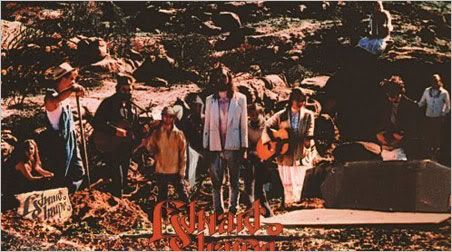
“40 Day Dream”
from the album Up From Below
2009
iTunes
Alex Ebert could easily double as some kind of indie-rock messiah. Fronting his new band, the 11- or 12-member strong Edward Sharpe & the Magnetic Zeros, Ebert appears onstage shirtless and barefoot, strands of shoulder-length hair tied back in a faux crown as he conducts his smiling, face-painted ensemble like a giddy choir director.
At those moments, he is no longer Alex Ebert, hard-partying lead singer of the dance-rock band Ima Robot; he becomes Edward Sharpe, his boyhood alter ego, and his band is his family. His agenda, as 1960s as it sounds, is little more than love and honesty.
“I’m a naked dude,” says Ebert. “I’ve been humbled to the floor.”
What he’s built is one of the more unusual musical acts to emerge from Los Angeles in some time. From their start as an unwieldy recording project for Ebert’s songs, the Zeros have become standard-bearers for the folk-rock revival.
Their big, open-hearted anthems evoke a different (but perhaps no less turbulent) era when cynicism and irony didn’t course through pop music like countermelodies. And the band’s aesthetic, no matter how organic its evolution, screams throwback — right down to touring in a converted school bus with the band’s name in script on the side and a driver named Cornfed.
“That bus is like stepping into a hippie wet dream,” drummer Josh Collazo jokes.
Last year a Flaunt magazine story coined a catchall for revivalists such as the Zeros: “hippie-sters.” Ebert cringes at that. “Categories … that’s insular stuff. It’s not real.”
What is, he says, is sharing the music that came out of his personal rebirth.
Ima Robot, which emerged as a reliable L.A. party band early in the decade and made two albums for Virgin Records, fit the younger Ebert’s live-fast mantra. “I used to say my primary motivation was getting things done before I die. I was getting a lot of things done, but I was a mess,” he says. “I ended up on a lot of drugs; I basically lost myself. The last two years we were on the major label, I became an automaton — I became a robot.
“It wasn’t anything about the music. With Ima Robot, life was all an exorcism. With this, it’s all an infusion.”
For a time, Ebert was living in a place with no phone. He met Jade Castrinos, who now sings in the band. He read Kerouac, attended AA meetings, and started working on songs in the Laurel Canyon house shared by now-bandmates Nico Aglietti and Aaron Older.
With the help of some seed money from the late Heath Ledger — who intended to start a music label out of the directors, artists and other creatives he funded, called The Masses — recording began. Friends of friends came to play and ended up joining the band.
“We decided to go back in time,” says Aglietti, who co-produced the album. “We got an old 24-track tape machine from 1979 and found a deal on used reels of 2-inch tape. Twelve people playing on 24 tracks, all recorded in live fashion. … I’m really proud of the dogma we kept; [the album] has a natural resonance to it.”
“It never felt like a grueling task,” says guitarist Christian Letts, who’s known Ebert since childhood. “This is a case of a group of people coming together at the right time. I don’t even think of it as a band, I think of it as a family.”
Ebert treats crowds like family. “The night [in April] I went into the crowd at the Echo and everybody was singing, you could almost feel their hearts,” he says.
“When you’re playing in this band, it’s not like there’s a glass partition between you and the audience,” Aglietti says. “There’s nothing about this band that’s ‘band-y.’ We’re kind of an art troupe that plays music.”


